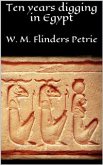WHY do you come to Egypt? Do you come to gain a dream, or to regain lost dreams of old; to gild your life with the drowsy gold of romance, to lose a creeping sorrow, to forget that too many of your hours are sullen, gray, bereft? What do you wish of Egypt? The Sphinx will not ask you, will not care. The Pyramids, lifting their unnumbered stones to the clear and wonderful skies, have held, still hold, their secrets; but they do not seek for yours. The terrific temples, the hot, mysterious tombs, odorous of the dead desires of men, crouching in and under the immeasurable sands, will mock you with their brooding silence, with their dim and somber repose. The brown children of the Nile, the toilers who sing their antique songs by the shadoof and the sakieh, the dragomans, the smiling goblin merchants, the Bedouins who lead your camel into the pale recesses of the dunes-these will not trouble themselves about your deep desires, your perhaps yearning hunger of the heart and the imagination. Yet Egypt is not unresponsive. I came back to her with dread, after fourteen years of absence-years filled for me with the rumors of her changes. And on the very day of my arrival she calmly reassured me. She told me in her supremely magical way that all was well with her. She taught me once more a lesson I had not quite forgotten, but that I was glad to learn again-the lesson that Egypt owes her most subtle, most inner beauty to Kheper, although she owes her marvels to men; that when he created the sun which shines upon her, he gave her the luster of her life, and that those who come to her must be sun-worshipers if they would truly and intimately understand the treasure of romance that lies heaped within her bosom.









